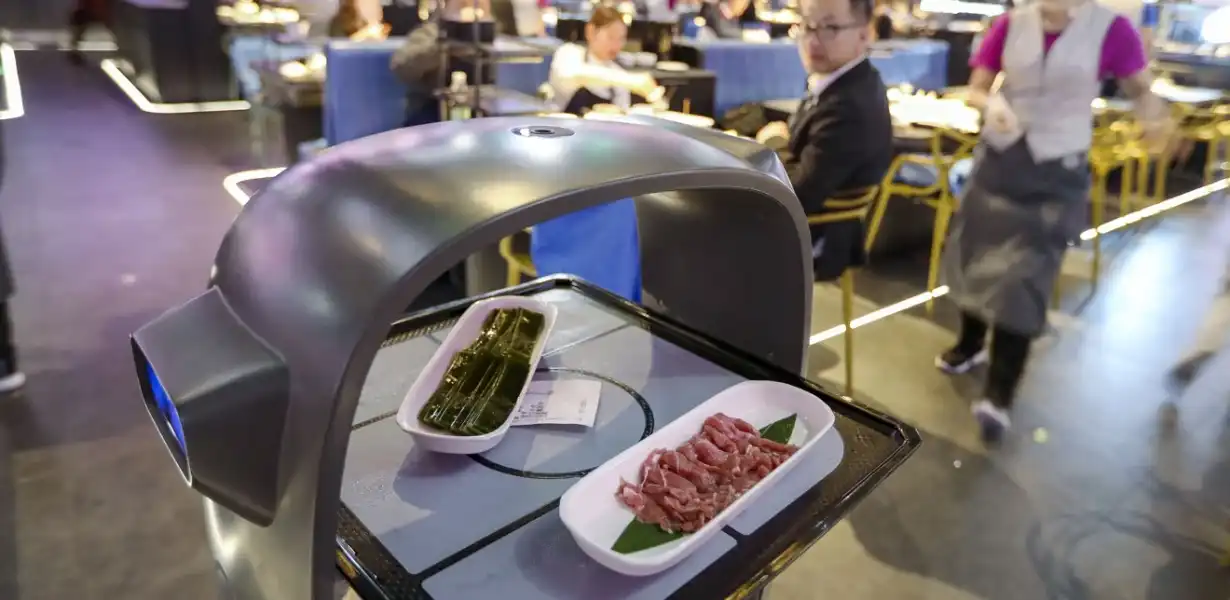Fine dining has entered a new era, one where artificial intelligence seamlessly integrates with gastronomic experiences, giving rise to smart restaurants that redefine the culinary landscape. In this blog, we delve into the intricate fusion of AI and gourmet, exploring how cutting-edge technology is reshaping the way we dine.
The Culinary Symphony Begins
Fine dining options have transcended traditional boundaries, orchestrating a symphony of flavors guided by the hand of artificial intelligence. From menu curation to personalized recommendations, AI has become the maestro of culinary creativity.
In a recent study by renowned culinary experts, it was revealed that AI-driven menus not only enhance customer satisfaction but also contribute to a significant increase in overall restaurant revenue. The ability of AI to analyze customer preferences, dietary restrictions, and real-time feedback ensures a tailored dining experience.
The Smart Kitchen Revolution
Step into the heart of these gastronomic marvels – the smart kitchen. AI algorithms optimize food preparation processes, ensuring precision, consistency, and the perfect fusion of ingredients. Smart kitchens not only elevate the quality of dishes but also streamline operations, making the culinary journey a seamless delight.
According to industry insiders, smart kitchens powered by AI have witnessed a 30% increase in operational efficiency, leading to quicker service and reduced wait times. This technological leap has not only captivated food enthusiasts but also garnered attention from renowned chefs worldwide.
Personalized Palates: A Gourmet AI Experience
Imagine a restaurant that knows your taste preferences better than you do. AI-driven personalization takes center stage, curating menus tailored to individual tastes. This level of personalization extends beyond menu choices to seating preferences, lighting, and even ambient music.
Studies suggest that restaurants implementing AI-driven personalization witness a 25% boost in customer loyalty. The ability to create an immersive dining experience based on individual preferences fosters a sense of connection between patrons and their chosen dining establishments.
AI and Sustainability: A Culinary Synergy
The AI revolution in gourmet extends beyond the dining table, addressing crucial concerns like sustainability. Smart restaurants leverage AI to optimize ingredient sourcing, reduce food wastage, and minimize environmental impact.
Recent data indicates a substantial decrease in carbon footprints in AI-equipped restaurants, with a commendable 40% reduction in food wastage. This eco-friendly approach not only aligns with global sustainability goals but also resonates with environmentally conscious diners.
The Future Unfolds: Innovations on the Horizon
As AI continues to evolve, so does its impact on the culinary world. From robotic chefs to augmented reality dining experiences, the future promises even more astonishing innovations. The fusion of AI and gourmet is a dynamic journey with endless possibilities, captivating the imagination of both chefs and diners alike.
Navigating Challenges: Balancing Tradition and Technology
While the AI revolution brings forth unparalleled advancements, it's crucial to navigate the delicate balance between tradition and technology. Preserving the authenticity of culinary artistry while embracing innovation remains a challenge that smart restaurants continually grapple with.
Experts suggest that maintaining a harmonious equilibrium requires constant adaptation and a deep understanding of both culinary heritage and technological nuances. Striking this balance ensures that the essence of fine dining remains intact while embracing the transformative power of AI.
Fine Dining in the Digital Age: Challenges and Opportunities
The integration of AI in gourmet experiences introduces a myriad of challenges and opportunities. Cybersecurity concerns, data privacy issues, and the need for skilled AI professionals are hurdles that smart restaurants must navigate to thrive in the digital age.
However, the opportunities are equally compelling. AI-powered marketing strategies, enhanced customer engagement through virtual experiences, and data-driven insights for business growth present a landscape rich with potential.
Crafting a Memorable Dining Experience: The Human Touch
Amidst the technological marvels, the importance of the human touch in fine dining cannot be overstated. While AI elevates efficiency and personalization, the warmth of human interaction remains a cornerstone of an unforgettable dining experience.
Industry leaders emphasize the significance of training staff to seamlessly integrate AI into their service, ensuring a perfect blend of technology and genuine hospitality. This union creates an environment where diners can savor not only exquisite dishes but also the warmth of human connection.
AI and Culinary Creativity: A Symbiotic Relationship
The synergy between AI and culinary creativity is a testament to the limitless possibilities that arise when technology and artistry intertwine. Chefs now harness the power of AI to push the boundaries of gastronomic innovation, creating dishes that captivate the senses and defy traditional norms.
Notable chefs worldwide embrace AI as a tool for inspiration, relying on algorithms to suggest unique ingredient combinations and cooking techniques. This dynamic collaboration between human ingenuity and artificial intelligence is redefining the very essence of gourmet cuisine.
Final Words
In the realm of AI-revolutionized gourmet, the journey is as savory as the destination. As smart restaurants continue to redefine the culinary landscape, the fusion of technology and tradition creates a tapestry of flavors that resonates with diners on a profound level. Embark on this culinary odyssey, where innovation and gastronomy dance in perfect harmony.
Commonly Asked Questions
1. How does AI personalize dining experiences in smart restaurants?
AI analyzes individual preferences, dietary restrictions, and real-time feedback to curate personalized menus, seating arrangements, lighting, and ambient music.
2. What impact does AI have on sustainability in the culinary industry?
AI optimizes ingredient sourcing, reduces food wastage, and minimizes environmental impact, leading to a commendable decrease in carbon footprints.
3. How can smart restaurants balance tradition and technology?
Striking a balance involves constant adaptation, preserving culinary heritage, and understanding technological nuances to ensure authenticity in fine dining experiences.
4. What challenges and opportunities does the digital age bring to fine dining?
Challenges include cybersecurity concerns and the need for skilled AI professionals, while opportunities include AI-powered marketing, enhanced customer engagement, and data-driven business growth.
5. How does the human touch remain relevant in AI-driven fine dining experiences?
The human touch is preserved through staff training, seamlessly integrating AI into service, ensuring a perfect blend of technology and genuine hospitality for a memorable dining experience.












